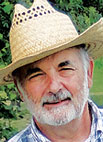 The road that brought Mike and Mary Jo Green to raising and selling locally grown sustainable sheep was paved with a love of good food. While Mike was raised in New York and Mary Jo in Arkansas, the couple met at a party in California. Wanting to impress the young lady, Mike invited her to go horseback riding on their first date only to discover Mary Jo owned her own horses. The ploy worked however, because the couple married.
The road that brought Mike and Mary Jo Green to raising and selling locally grown sustainable sheep was paved with a love of good food. While Mike was raised in New York and Mary Jo in Arkansas, the couple met at a party in California. Wanting to impress the young lady, Mike invited her to go horseback riding on their first date only to discover Mary Jo owned her own horses. The ploy worked however, because the couple married.
Twenty-three years ago the couple purchased 13 acres outside of Cave Springs, Ark. Because of their love for good food, they planted apple trees, blueberries and black raspberries. In 2008, the couple decided to raise lamb for their own consumption. Mike laughed and said, “Lamb was hard to come by for us, but that little project has gotten out of hand. Now I have as much as I can handle.”
Mike retired from the Air Force and sold real estate while Mary Jo worked for Delta at the Northwest Regional Airport. Two years ago both retired and went into the sheep business.
Mike explained that only 1 percent of the population is regular lamb eaters and that the per capita consumption of lamb is only 1 pound per person. However, northwest Arkansas is a more affluent area with people who appreciate locally grown and sustainable agricultural products, including lamb. The Green farm has 25 to 30 commercial ewes at any given time with one Dorper ram. The Greens also raise their own replacement ewes so the Dorpor influence is increasing in the herd. Mike said, “The Dorper meat to bone ratio is better than other meat breeds, and since we are in the business of producing meat, using a Dorper ram makes sense.”
Mike’s herd is very healthy which he attributes to paying attention to soil conditions and to pasture rotation with seven pastures on his 13 acres. The drought prompted Mike to have his soil tested which he found to be lacking only in nitrogen. To promote optimum growth he uses a urea nitrogen 46-0-0 fertilizer applying two thirds in the spring and one third in the fall. In addition to the typical Bermuda and fescue grasses, Mike also seeds with Cool Grazer Rye for fall and Red River Crabgrass for spring.
While Mike readily admits that his biggest challenge is lambing during the winter months, lambing at that time is essential so the lambs are ready for market at the Bentonville’s Farmers Market by the last week of April. To help combat the problem, Mike recently built a new livestock barn where the sheep can come and go as they please. Some ewes still prefer to lamb outside but can bring the newborns inside whenever they want.
The Green farm not only sells meat at the Bentonville Farmers Market but also to local restaurants such as Tusk and Trotter and the Hive located on the Bentonville Square. They also sell lamb for special events such as one recently held at Crystal Bridges. In addition their lamb was featured at the James Beard House in New York City where two local chefs and the culinary director of Crystal Bridges went to prepare a meal for 170 guests. On September 9, the James Beard Foundation is coming to the farm for a chef boot camp featuring Food Network chefs. That night chefs will collaborate at the 21 C Hotel to demonstrate how to use the entire animal to produce excellent cuisine.
Not willing to let anything go to waste, the couple also runs a bed and breakfast. Mike said, “We have as many guests as we can handle while still being able to travel.” Mike believes one of the best benefits of the bed and breakfast is getting to meet new and interesting people from widely diverse backgrounds and locations.







